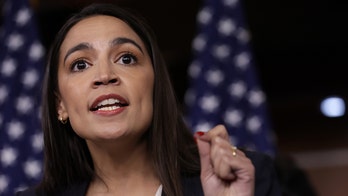Alaska Gov. Sarah Palin, who plans to step down at the end of the month, isn't going quietly into the night.
In an opinion article published by the Washington Post Tuesday, Palin called President Obama's energy plan, also known as cap and trade, "an enormous threat to our economy."
"Job losses are so certain under this cap-and-tax plan that it includes a provision accommodating newly unemployed workers from the resulting dried-up energy sector to the tune of $4.2 billion over eight years," she wrote.
Democratic leaders were pleased when the bill passed the House, saying it will combat global warming and invest in new sources of energy.
But it passed by only seven votes with 44 Democrats voting against it. That could portend trouble for the measure in the Senate.
And the president's energy policy is also facing opposition from his left flank. Environmental groups say the House, in order to get a bill passed, gave away too many carbon-emitting permits and credits to businesses, which Green Peace USA says defeats the purpose of the bill.
The environmental group called the bill "a victory for coal industry lobbyists, oil industry lobbyists, agriculture industry lobbyists, steel and cement industry lobbyists."
Another part of the president's carbon emissions policy also is running into controversy.
One Republican lawmaker charges that the Obama administration was too secretive in meetings that climate czar Carol Browner and California officials held with the auto industry to set new national fuel economy and emissions standards.
The Bush administration faced similar criticism when then-Vice President Dick Cheney held closed-door meetings with oil and gas and environmental leaders as that administration put together its energy policy.
Mary Nichols, the head of the California Air Resources Board, told The New York Times, "We put nothing in writing, ever… That was one of the ways we made sure that everyone's ability to talk freely was protected."
But Rep. Jim Sensenbrenner doesn't see it like that.
"I think it's something more sinister because usually there are extensive notes taken on any regulatory decisions," the Wisconsin Republican said.
Sensenbrenner said he's concerned that alternative views may been suppressed in the process and he's calling for an investigation into what he calls the "lack of transparency at EPA."




